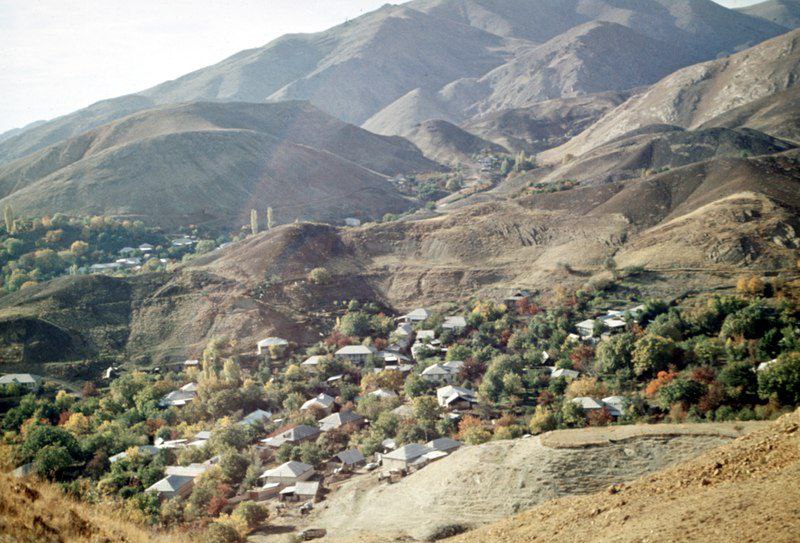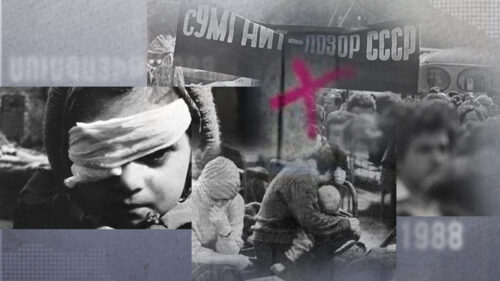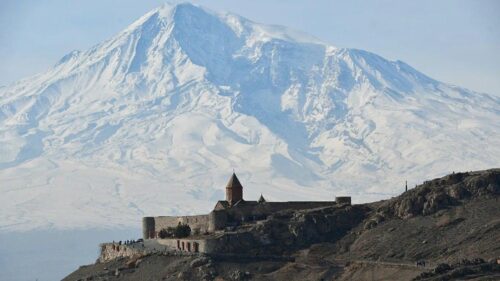
I live in Jermuk with dreams of returning to Nakhijevan: Memories of Greta Soghomonyan from the village of Znapert
“I can’t briefly tell the story of our village; oh, I constantly want to talk about our home, the yard, my mother, our villagers; is it okay?” begins Greta Soghomonyan, who was displaced from the village of Znapert in Nakhijevan and now lives in Jermuk.
“I was born in 1955 into a villagers’ family. My mother was a housewife, my father a brigade commander and winemaker. I had such a wonderful childhood in our home. My mother was the village ‘ambulance’; if someone fell ill or needed something, they would run to our place. I remember one day, one of our villagers came running from the upper quarter to our house and told my mother, ‘Dzonik, my child is in its postpartum confinement; he has a stomachache, can you help him? Will you give me dried tortoise eggs?’ I was silently watching. My mother immediately went into the room and came out with a whitish powder wrapped in paper. Showering blessings, the woman left our home,” Mrs. Greta says, recalling an episode from her childhood.
Yes, you read that right—dried tortoise eggs. There were many tortoises in Znapert village; perhaps there still are, we don’t know. Almost every backyard had tortoises, which served as live “toys” for children and food for men, while for Greta’s mother, they were a remedy. After killing the tortoise, the egg would be left in the sun to dry. Once dried, it would become a fine powder, which was used for stomachaches. The cellar in Nakhijevan was filled for both ordinary and special days.
“I first left Nakhijevan after finishing the 10th grade in 1972. I was a student in Soviet Yerevan. I could never return home. My father, Sisak Soghomonyan, would always recount how they left the village. There was a Turkish boy close to our family who came one day on a motorcycle and said that we should leave the village by 11:00 p.m. that evening, as there would be an attack. Our family didn’t know whether to believe him or not. Women and children were evacuated while the men stayed behind. The young boys were sent close to the border and were instructed that if they saw the enemy, they should fire with their hunting rifles. Leaving the village’s houses, vineyards, and fields behind, the boys reached the border. Moments after the time mentioned by the Turkish boy, they heard noises and realized there was an attack,” Greta Soghomonyan says.
The boys knew every nook and cranny of the village. They set the vineyards on fire as a form of assault and began fighting as best they could.
“When dawn broke, our people were amazed by their ‘work,’ but what good was it? Now, where are they? Their resistance ended with displacement. They lived in Armenia with longing and the hope of returning home. Sometimes when my children gather, I say, ‘As soon as we liberate our land, I will go there barefoot,'” Mrs. Greta says.
After completing her studies, Mrs. Greta got married in Jermuk. She is the only one from Nakhijevan in her household, but her family is well-acquainted with Nakhijevani dishes and customs.
“My brother’s classmate published a book about Znapert; they gave one to my father as well. Well, I ‘stole’ it from my father and brought it to Jermuk. Now, when I miss our home, I open it, read it, and remember,” the woman from Nakhijevan says.
In their home in Jermuk, she makes rosehip soup and korkot (ground, par-boiled shelled wheat) to a traditional Nakhijevani recipe and bakes gata.
“Our korkot recipe is different: we roast seven types of grains and mix them together. We do this on Trndez (a feast of purification in the Armenian Apostolic Church). On that day, we definitely bake gata with a coin inside,” Greta says.
Her family, uncles, and relatives settled in the village of Yeghegnavan in the Ararat province after being displaced from Nakhijevan. Other villagers settled in a village in the Vayots Dzor province, naming it Upper Znapert.
“I would like to appeal to the head of Upper Znapert, our village head, to give me a plot of land and a small house so I can go, see my villagers, speak with them in our dialect, and remember the life we left behind. For so many years, I haven’t been able to go there even for a few hours. Can you believe it? Every day I remember our house, I’m already telling my grandchildren about it,” the 70-year-old woman says.
Speaking about their dialect, Mrs. Greta takes pride in it, saying that it is rather soft and distinctive. She recalls how relatives from Yerevan would visit the village and immediately start speaking in the dialect. “Our language is very easy to learn,” she says with open admiration.
When asked about the future, she sighs and struggles to respond: “The whole world is in turmoil. I am skeptical; I can’t imagine my future, I don’t know what will happen. I always say that hardships are temporary, and with that thought, I brighten both my present and my future.”
Ani Abaghyan



